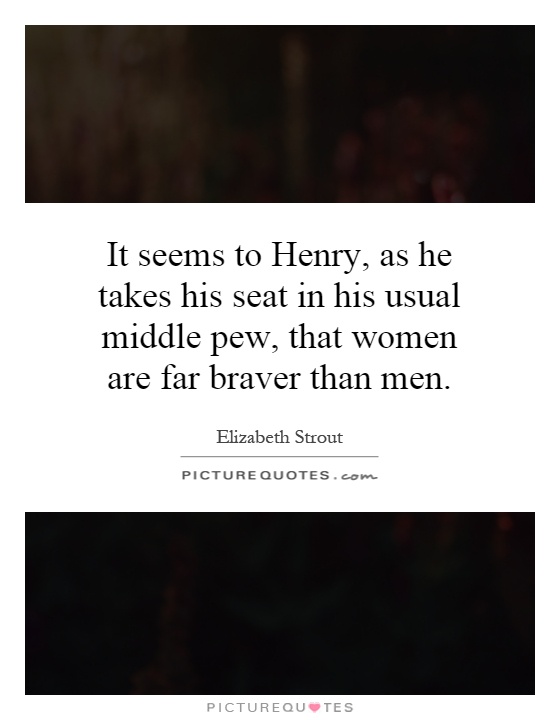It seems to Henry, as he takes his seat in his usual middle pew, that women are far braver than men

It seems to Henry, as he takes his seat in his usual middle pew, that women are far braver than men
In Elizabeth Strout's novel "Olive Kitteridge," the character of Henry Kitteridge often finds himself reflecting on the complexities of human nature and relationships. As he takes his seat in his usual middle pew at church, he can't help but notice the strength and bravery exhibited by the women around him. It seems to Henry that women are far braver than men, a realization that both surprises and intrigues him.Throughout the novel, Strout delves into the lives of the women in Henry's community, showcasing their resilience in the face of adversity. From Olive Kitteridge herself, a strong-willed and independent woman who faces her own struggles with mental health and relationships, to the other female characters who navigate the complexities of love, loss, and self-discovery, Strout paints a vivid portrait of the courage and fortitude of women.
Henry's observation that women are braver than men speaks to the societal expectations and gender roles that have long dictated how individuals are supposed to behave. In a world where men are often praised for their stoicism and strength, women are frequently overlooked for their own acts of bravery and courage. However, as Henry witnesses the women in his community face their own challenges with grace and resilience, he begins to question these traditional notions of bravery and strength.
As Henry reflects on the women in his life, he realizes that their bravery lies not in grand gestures or acts of heroism, but in the quiet moments of strength and perseverance that define their everyday lives. Whether it's Olive standing up for herself in the face of criticism or a mother quietly enduring the pain of loss, the women in Henry's world exemplify a different kind of bravery – one that is rooted in vulnerability, empathy, and compassion.












 Friendship Quotes
Friendship Quotes Love Quotes
Love Quotes Life Quotes
Life Quotes Funny Quotes
Funny Quotes Motivational Quotes
Motivational Quotes Inspirational Quotes
Inspirational Quotes